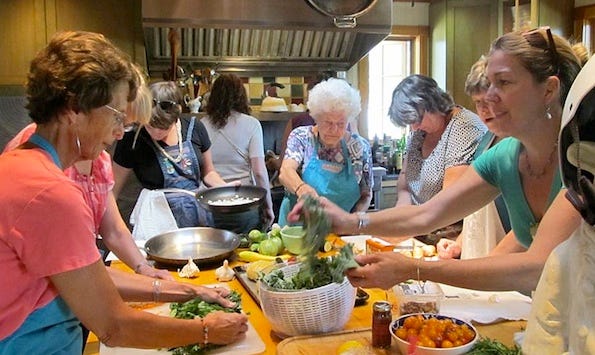Pastures of Plenty: Organic farming—in living colorPastures of Plenty: Organic farming—in living color
From the full-flavored menus at Big Bang Catering to a field-to-table event at their Pastures of Plenty farm, this organically run business offers much more than fantastic, healthy food. Reported by Organic Connections, the magazine of Natural Vitality.
January 2, 2013


Pastures of Plenty, located in Boulder, Colorado, is a 35-acre organic farm with a wonderful and sustainable history. But in this case it doesn’t just show in the taste bursting from the vegetables and herbs grown here—you can actually see it in the rich, vibrant color of the flowers.
The current incarnation of the farm (it actually dates back to 1887) was co-founded by husband and wife Lyle and Sylvia Davis. The organic blooms, which now bring breathtaking beauty to CSA shipments, decorate the tables at the farm’s own field-to-table events, and appear at weddings and other functions all over Boulder, were originally an economic idea.
“My friend and neighbor Chet Anderson was the one who taught me about what he called the ‘bend-over factor,’” Lyle Davis told Organic Connections. “Chet said, `You can bend over; you can plant beets; you can till, harvest and bunch them and take them to market, and you can sell them for a buck to two bucks a bunch. But you can do the same things with sunflowers and sell them for ten dollars a bunch.’”
Another reason for the planting of flowers had to do with a much-sought-after bloom for weddings. “When my wife, Sylvia, had done catering a few years back, she’d handled a number of weddings and parties in June where people just coveted peonies,” Davis explained. “Peonies only bloom for three or four weeks out of the year, and they’re a really astonishingly beautiful perennial small-flower bush. When we bought the farm, we had this idea that besides having this little farm, our main crop could be peonies. So, much as people raise turkeys for Thanksgiving, we were going to raise peonies for the wedding season. The combination of Sylvia’s insight into peonies and Chet’s educating me about the bend-over factor led to our growing flowers in combination with vegetables.”
Making the farm work
Despite the financial impetus for growing flowers, the love that shows in Pastures of Plenty’s produce and beautiful blooms is an actual caring for the land that Davis and his wife fought to make economically viable. Davis didn’t do it for the money—in fact he turned his back on a much more profitable venture, simply because he didn’t like the business culture.
Davis was one of the founders of Alfalfa’s Market, one of the very first natural supermarkets that came up in the eighties. This cultural shift was followed not long after by another. “The industry changed again in the early nineties when Whole Foods Market went public,” said Davis. “That was the onset of guys wandering around in suits, when natural foods suddenly started existing on the edges of corporate America.”
As a highly profitable chain, Alfalfa’s Market finally came to the attention of investors. “In 1996, there were decisions made to grow Alfalfa’s,” Davis related. “The idea was to sell off blocks of the company to investment bankers, who were kind of big in the old days of stock clubs, when everybody was making money on this and that and penny stocks. The long and short of it was that the investment bankers forced a sale. Wild Oats bought us and it didn’t take me long to realize that that was a company culture I abhorred. I was just really unhappy, and more or less simultaneously I was fired and I quit—one of those kinds of deals.”
At that point Davis turned his attention to his farm, which he had already been working since 1993, and he soon realized that, solely as a farm, it would not properly support him and his wife and their four children. “For the next year I really worked the farm, and it didn’t take me long to recognize that I wasn’t going to raise four kids on a 35-acre farm,” he said. “I had to come up with some other ideas.”
Farm-to-table catering and events

The first idea was to add a catering business, which Davis and partner John Howlett had already been doing part time. The second idea was to host farm-to-table events at the farm—which in those days had hardly been done.
“When Sylvia and I became a couple in 1989, we were climbing Wheeler Peak in New Mexico,” Davis recounted. “On the way up we had this highly energized conversation about, wouldn’t it be amazing to have a place we could call ‘field to table’? We didn’t even know the term farm to table. It could be a place where we’d have big gardens and we would grow food and cook it right on site. We would serve on beautiful wood tables, like can be seen in France and Italy, and decorate with all the flowers.” It was an idea that remained dormant until Davis decided to expand his business, when it then found its place and has since developed into a highly successful full-service farm-to-table event facility.
It’s not surprising that Davis pursued and found his dream in Pastures of Plenty: it was in his blood. “When I was quite young, my dad had read the famous book about pesticides, Silent Spring by Rachel Carson,” he recalled. “He subscribed to Organic Gardening magazine back in the late fifties and sixties, and we had a garden. My mom was a wonderful French cook, who would prepare meals from the garden and wild harvest. Food was an important part of our growing up.”
Davis went on to pursue great cooking all over the world. It was this sense of fine cuisine that carried forward, and these international flavors have now found their way onto his menus.
For Davis, natural food had never meant boring food. He first made sure it was introduced at Alfalfa’s Market. “Early on, people were eating a lot of raw tofu and weird brown rice with no flavoring,” Davis said. “I didn’t actually ever get the difference between what I grew up calling gourmet food and what was being called natural food, other than a lot of it kind of sucked; it didn’t taste very good and they didn’t really know how to cook it. One of the things Alfalfa’s did was blend gourmet foods and natural foods.”
Bringing it all back home
Today, all of these elements combine to bring a thriving business to Pastures of Plenty and Big Bang Catering. CSA subscribers obtain the tastiest of produce. Catering customers and attendees of field-to-table events partake of the same, with mouthwatering culinary creations perfectly prepared by Davis. And it’s all capped by the unique touch of plentiful, beautiful flowers.
From this place and through his enterprises, Davis is simply demonstrating his version of life itself. “Small-scale community-based agriculture—be it the farmers’ markets or CSAs—is just an essential component of a healthy, happy society,” Davis concluded. “It’s people who have that genuine connection to where their food is coming from and believe that food has a human face to it—whether it’s knowing your chef in your favorite restaurant, or the guy who grew your salad greens, or playing with your own 50-foot-by-50-foot plot or your own little urban garden with a few potted tomato plants. That personal relationship is just an essential part of what we used to call both physical and mental health.”
For more information on Pastures of Plenty and Big Bang catering service, visit www.bigbangcatering.com.
Read more articles on organicconnectmag.com
About the Author
You May Also Like



